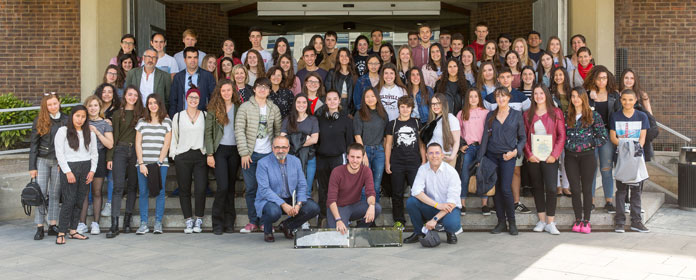145 students from Navarre participate in project MicroMundo
IES Zizur, IES Navarro Villoslada, high school Hijas de Jesús, high school Nuestra Señora del Huerto, high school San Cernin and high school Escolapios de Tafalla were the schools participating in the 2019 edition.

PHOTO: Manuel Castells
145 students from six schools in Navarra have participated in this citizen science initiative that aims to discover new antibiotic-producing bacteria, transmit to society the importance of the use of these drugs manager , and awaken scientific vocations among young people.
The project MicroMundo is an international initiative that began in 2012 at Yale University (USA). It has since spread to more than 200 universities in 20 countries. The project involves students from high school diploma and undergraduates who together perform service learning activities in the field of microbiology.
The activity developed in Navarra has consisted of five practical sessions, taught in schools between January and March, in which students have isolated bacteria from soil samples and selected those capable of producing antibiotics that inhibit other bacteria. The sessions also covered topics such as the threat of multi-resistant superbugs to antibiotics and how to avoid this problem.
David González, coordinator of project in Navarra and professor of department of Microbiology and Parasitology of the University of Navarra, has highlighted the informative and educational component that these sessions have for the new generations: "what we intend is to disseminate science and promote scientific careers, exposing a real topic (antibiotic resistance) and thus seek new treatment alternatives".
The sessions -taught by students from Degrees of Biology and Biochemistry of the University of Navarra- have been developed in classrooms of 3rd and 4th of ESO, and 1st of ESO, with a practical and . high school diploma with a practical approach and educational. Maite Jiménez, teacher at IES Zizur, described the experience as an "opportunity" for her students and emphasized the transmission of scientific culture through projects like this one.
Some students who have participated in the activities -NaiaraArancón and Idoia Ortega from IES Zizur and Andrei Paraschivoiv from IES Navarro Villoslada- have positively valued the methodology used and the applicability of the sessions: "It is an effective, different, internship and fun way to learn by doing science", says Arancón.
On Wednesday, June 12, MicroMundo Navarra closed the 2019 edition of project with submission with the awarding of diplomas to the 145 participating students from Navarra. In this edition, nearly a thousand bacteria have been isolated from the soil, of which only 78 have been able to inhibit the growth of other bacteria. "Now we will have to continue studying these selected bacteria to check if they are really producers of broad-spectrum antibiotics," says David Gonzalez.
The Navarra node of MicroMundo is a voluntary initiative that began last year and is coordinated by professors and doctoral students from department of Microbiology and Parasitology of the University of Navarra.
